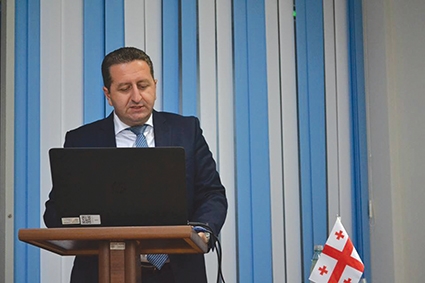The First Georgia International Maritime Forum to Promote Georgia Maritime Potential
The first Georgia International Maritime Forum (GIMF) is to be held on September 12-16 in Batumi, under the patronage of Prime Minister Giorgi Kvirikashvili. The Forum aims to position Georgia as a Maritime nation; a reliable, strong partner that shares common values with the global international maritime community.
We had a chance to speak to Captain Mamuka Akhaladze, Director of the Maritime Transport Agency of the Ministry of Economy and Sustainable Development of Georgia, IMO Maritime Ambassador to Georgia, Master Mariner, and AFNI, IFSMA.
Captain Akhaladze, How did the idea of the GIMF come about? What are your expectations?
The idea of organizing the International Maritime Forum in Georgia belongs to the First Vice Prime Minister, Minister of Economy and Sustainable Development of Georgia, Dimitry Kumsishvili. He introduced it in his speech at the 29th Assembly of the International Maritime Organization (IMO) while talking about the recent reforms in the Georgian Maritime industry and their positive outcomes. It was there that 170 member states of the IMO were invited to attend the Forum in Batumi.
On September 12-16, Georgia’s maritime gateway, Batumi, will become a meeting point for the major international maritime, shipping and financial institutions, with discussion topics ranging from commercial operations of ships, to technical regulations and environmental safety standards for the seas, with high-profile guests from 140 countries attending. Such events are of crucial importance for positioning Georgia as a maritime country to the wider international audience. In order to be considered as a country of high investment potential, with possibilities to develop the maritime industry and services, for our seafarers to be in demand on international markets, and for the Georgian flag to be more attractive for foreign ship owners, such initiatives and projects as the International Maritime Forum need to be held regularly.
Can you tell us about the reforms in the industry in recent years?
There are numerous significant achievements that I would like to underline: First of all, the European Union resumed acceptance of certificates of competency for Georgian seafarers. For the first time in Georgian history, the Georgian Maritime flag is finally off the black list and the competitivness of the country’s tonnage has increased on the world market by quality ships. The Maritime Transport Agency (MTA) of Georgia has been successfully audited (EMSA) (IMSAS), has commenced a quality management system, and has implemented customer oriented services. The Maritime legislaton base has been improved and updated. MTA offers a 24/7 service to ship owners. Ship registration fees have been reduced. The Agency issues new documents for seafarers that are safe from forgery. We’ve also created a state electronic database for seafarers. The fees for certifications are 50% lower. MTA has signed memorandums of understanding with 46 countries. The administrative building of the Agency was relocated to the country’s maritime center, which enabled us to plan our activities duly and effectively. MTA staff consists of highly qualified personnel, offered professional trainings periodically. The Agency is using any available platorm to promote Georgia as a country for potential financial investment. The Maritime Rescue Coordination Center unit, responsible for dealing with oil spills at sea, is equipped according to current standards. The Agency is ready to react to perform necessary sea rescue operations 24/7. At the same time, MTA introduced modern systems for vessel traffic service in the ports. And these are just our success stories since 2012. I would also like to mention that MTA’s future plans are largely centered on promoting Georgia’s Maritime flag, through increasing the number of Georgian vessels on the international Maritime scene. It is also a top priority for our agency to provide the highest quality education to our seafarers. Another very important issue is ensuring safety at sea.
What can you say about our country’s relations with the IMO? How do you think mutual cooperation with the IMO can be deepened?
Georgia has been a member of the IMO since 1993. I’m honored to be IMO’s Maritime Ambassador in Georgia. Since 2010, Georgia has received invaluable support from the organization through its expertise and consultancy, together with assistance in providing professional educational training to Agency staff members. The fact that the IMO secretary general is attending our Forum and that the working sessions of two of the global projects realized under the aegis of IMO (Global Maritine Energy Efficiency Project) and the meeting of Black and Caspian Sea administration officials, on the topic of Maritime policy formation and implementation, speaks for itself. Georgia tends to be a leader on a regional level, being the only country regionally involved in the GloMEEP, project, which concerns implementation of Maritime energy- efficiency on the national level.
What can Georgia offer international partners? What needs to be done to present it more effectively as a reliable and strong partner?
The Georgian Maritime industry plays a crucial role in the economic development of our country. Georgia historically is a part of the Silk Road transport corridor and among one of the oldest Maritime countries in the world. As Georgia’s unique geographical location gives it an important transit status, Georgia has the potential to become a Maritime center for the Black Sea region.
Intergovernmental agreements and belateral memorandums are expected to be signed during the Forum, together with some very important meetings to be held with the representatives of leading foreign maritime companies. Yet it is crucial to make Georgian legislative and tax systems more flexible for international shipping companies, thus bringing finacial investments to the country.
Nino Gugunishvili











